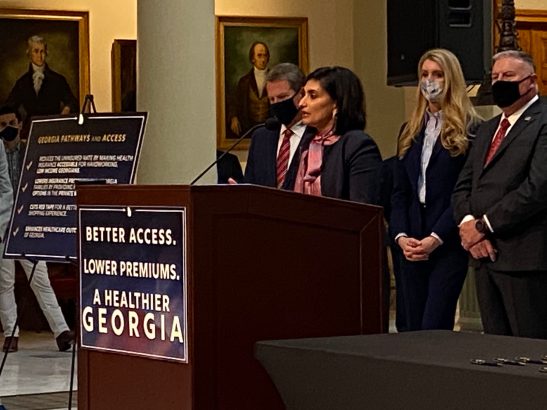Federal officials, as expected, have approved Georgia’s waiver request to revamp the state’s health insurance market for people who don’t get job-based or government coverage.
The waiver will create a “reinsurance’’ program that state officials estimate will cut insurance premiums for individual coverage by an average of 10 percent.
It will also replace the healthcare.gov enrollment system with a new online platform that people will use to sign up for insurance coverage. Individuals will enroll directly with insurers, with local brokers or agents, or through private-sector broker sites.

Reinsurance aims to stabilize health insurance premiums by capping the cost that insurers incur in covering people with high medical costs.
The reinsurance provision has been embraced by both supporters and opponents of the Affordable Care Act (ACA), the federal law that created the exchange. But the change in how people enroll has generated sharp disagreement.
Neither change will take effect right away. Reinsurance will begin in 2022, and the new enrollment set-up will debut in 2023. Georgia consumers needing coverage for next year will still shop for their health plans on healthcare.gov. Open enrollment ends Dec. 15.
The waiver approval, announced Sunday, comes just days after federal officials signed off on Georgia’s plan to provide a path for low-income adults to receive Medicaid coverage if they meet certain requirements.

States must get federal permission for changes in certain health care programs, and Gov. Brian Kemp submitted the two proposals for waivers several months ago.
“The ACA waiver provides an opportunity for Georgia to go further than any state in the nation: allowing Georgia consumers to choose among a greater number of plans, and not be limited to the costly offerings on the federal marketplace, healthcare.gov,’’ said Kyle Wingfield, president and CEO of the Georgia Public Policy Foundation. “This will open the door to greater competition and more options, and set a national example for other states to build upon.”
Consumer groups have pushed back against the enrollment overhaul, pointing out that the current insurance exchange offers more options for Georgians than in previous years.
“Georgia’s marketplace has proven quite resilient,’’ Laura Colbert of the consumer advocacy group Georgians for a Healthy Future said Monday.
“In the last two years, we have seen increases in insurer participation and thus improved choice for consumers,’’ Colbert said. “Premium prices went down last year, and this year they grew at a lower rate than inflation. Last year, enrollment in Georgia’s marketplace grew even while enrollment fell nationally. These are signs of a successful, resilient market, which the governor’s proposal will completely upend.”
Under section 1332 of the ACA, states are allowed to waive certain provisions of the ACA as long as their plan meets certain criteria. These “guardrails’’ require that people retain access to coverage that’s at least as comprehensive and affordable as would be available without the waiver; that the waiver covers a comparable number of individuals; and that the changes don’t increase the federal deficit.

“Since implementation, the Obamacare [ACA] exchanges have not worked for Georgians, leaving them with fewer options and skyrocketing premiums,” Seema Verma, administrator of the federal Centers for Medicare and Medicaid Services, said in a statement Sunday. “Today’s approval of the state’s waiver will usher in a groundswell of health care innovation that will deliver lower costs, better care, and more choice to Georgians in the individual market.’’
Earlier this year, Georgia altered its approach on the insurance exchange waiver. Officials dropped the idea of state management of the subsidies offered to consumers. A provision that could limit financial help for consumers was jettisoned as well.
Colbert said the waiver plan “still fails to explain why or how a decentralized, privatized system will be better equipped to address the challenges of Georgia consumers, especially those who remain uninsured.’’

“Georgians and their families would be much better served by proposal that maintains healthcare.gov (or sets up a Georgia alternative) and also incentivizes community-based organizations, as well as agents, brokers, and carriers to reach unserved Georgians.”
Also sparking much debate is Kemp’s waiver plan to increase Medicaid enrollment.
It contains “qualifying activities’’ for recipients, meaning an individual must be engaged in at least one of these activities to be eligible for Medicaid. They include working no fewer than 80 hours a month, being enrolled in a school or in job training, or participating in a volunteer program.
Because of these restrictions, Georgia officials have estimated that about 50,000 people will get coverage through Pathways. Critics, including many Democrats, note that this number is just a fraction of the 500,000 who would get coverage through a standard Medicaid expansion under the ACA.
Medicaid expansion has been adopted by 38 states but has consistently been rejected by Georgia’s Republican-led government, with officials saying it would be too costly.

